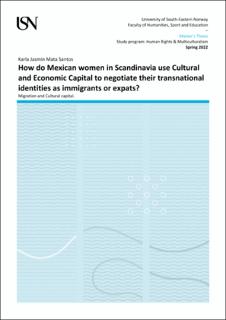| dc.description.abstract | The international growing Mexican female migration to Norway and Sweden has given rise to a different perspective to the negotiation of transnational identities. The dominant discourse on female immigrants often has no consideration of individual agency, focusing instead on women as dependent partners to either male migrants or to Norwegian and Swedish men. Previous research on the largest groups of immigrant women who are partners of native Norwegians and Swedish men, such as Thai and Russian women, has primarily focused on immigration settlements of family reunification, enhancing misconceptions affecting immigration status in social and legal spheres. Thus, studies on migrants from the west such as U.S. Americans had resisted the label of immigrants and have presented different types of acceptance due to the preconception of a higher status globally as expats. The resistance to the term ‘immigrant’ and considering ‘expat’ a more applicable term was also found within Mexicans in Scandinavia.
This study conducted a thematic analysis through semi-structured interviews with educated Mexican women living in Norway and Sweden who had studied a higher education in the previous countries mentioned. The following themes emerged: 1) Individual Agency in a Transnational Relationship, 2) Education and Language as Cultural Capital, 3) Social Class as Economic Capital, 4) Racialization and Exotism and 5) Negotiating identity as immigrant or expat, providing insights into the experiences of immigrant women from the Global South tackling stereotypes, self-perceptions and prejudice that play a significant role in the process of self-identity and society’s recognition. Contrary to popular belief, Mexican women's cultural and economic capital was primarily acquired prior to migration, giving them a unique individual agency, social status, and power dynamic, as sociologist Pierre Bourdieu discusses in the Theory of Capital. Furthermore, one finding suggests that the transnational identity and self-perception as Mexicans living in Norway and Sweden may be developing into a Mexican diaspora in Norway and Sweden.
Key words: Mexicans living in Norway, Mexicans living in Sweden, immigrants, expats. | |
